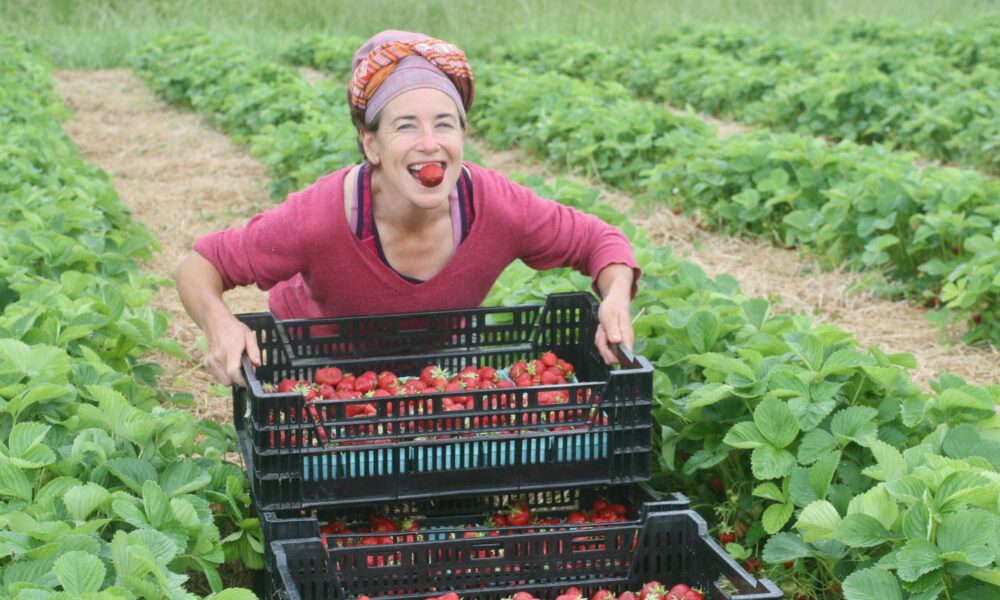

Today we’d like to introduce you to Brooke Salvaggio.
Alright, so thank you so much for sharing your story and insight with our readers. To kick things off, can you tell us a bit about how you got started?
Dan and I weren’t born farmers. Anything but! We both grew up in urban and suburban Kansas City with “normal” families with professional parents that didn’t have practical skills. The normalcy of American suburbia struck us as both boring and unsustainable. I was an impassioned, punk-rock art-school drop-out who abhorred consumerism, suburbia, the status-quo, and just about everything I’d grown up around.
Dan was a quiet, thoughtful environmentalist & academic who thought critically about his personal choices and his surroundings. In our empathy, rage, rebellion, and yearning for something more meaningful – we ended up finding the soil and each other. It sounds cheesy, I know, but make no mistake: This is NOT a love story!
This is a story about two people stubbornly striving to change the fabric of their lives, the landscape, and the larger community – fighting for an idea and vision that didn’t exist in any city anywhere in the US while romancing the soil & growing great food along the way.
We both found farming in very different ways. I dropped out of a prestigious art school after getting fed up with privileged hipsters living on their parents’ credit cards, pretending to change the world with their abstract masterpieces. (For the record, I love artists and all they contribute, but that was my perception of the scene at that time.) Once I left school, I felt pretty purposeless and lost. I didn’t know where to direct my creativity and passion. I’d always been an artist. What now? The activist was growing in me, but still, at that point in my life, I’d only served myself. If I no longer derived satisfaction through massaging my own ego through artistic expression, what the heck was left for me? So, in a very dramatic way, I decided to travel to older parts of the world in search of “meaning”. But I had no money. In order to fund my travels, I worked on farms in exchange for room and board. After discovering bits of Roman jewelry while digging potatoes in Italy, I realized “this is it”. I need to be hunched over in the soil with my hands in the dirt. This is my purpose. If nothing else, I will grow food… life-sustaining FOOD.
Dan found farming after finishing a degree in urban planning. He spent two consecutive farm seasons working on a friend’s family orchard. He sought the job out in the hope of obtaining some good writing material. He lived & worked alongside migrant workers from Mexico to learn their stories, experience their struggles, and understand the physical & emotional toil that comes from migrant farm labor. Had he followed through with the writing, he might have been published in a number of magazines. As it turned out, he was too tired to write after 14 hour days in the field. He was swept up in the physical work, sweat, and unending picking of one seasonal fruit after another. He was singing songs in Spanish with these guys, learning their quirks and personalities, working harder than he’d ever worked, and pulling muscles he never knew he had. By the end of it all, he didn’t want to go back to college or to work at a desk. He wanted to be outside, in the elements, growing food.
Once we got hooked on farming, lots happened. Too much to tell. In a nutshell, Dan and I met for the first time back in KC at a soil science workshop. He was the only other young guy in the room, and well, we fell in love! I had started a market garden in my grandfather’s two-acre backyard, as well as a radical farmers market & events space in the Crossroads, known as the BAD SEED. He was managing an urban farm in KCK.
Dan eventually quit his job, and joined me in my exploits. We rocked out my little backyard farm for two years together (growing enough food to support ourselves and our badass BAD SEED market). However, the white supremacists got in the way (like they always do). In 2009, some not-so-nice neighbors attempted to run us out of the South KC neighborhood where we farmed. By their reasoning, the presence of a “farm” would lower their property values and allow “poor black families to move into their neighborhood” That’s literally what they said. GROSS! Here we are giggling and growing heirloom beans & tomatoes, and meanwhile, my neighbors are talking about a “white flight”.
It was the most appalling, outrageous thing we’d ever heard. Being the dramatic person that I am, I quickly brought this crisis to the community & the media. It became a big ol’ thing and pretty soon we and other community-minded individuals/organizations were fighting these personalities in City Hall. We lost the battle (meaning we couldn’t continue our farming activities on that property) but more importantly, we won the war and Kansas City passed a series of “urban agriculture ordinances” that protect farmers & gardeners and relax certain restrictions to make green growth and healthy food more attainable in the city.
Now chapter two officially begins – the quest to build URBAVORE – the 13.5-acre farmstead that we manage today, 5 miles east of the Country Club Plaza…
Can you talk to us a bit about the challenges and lessons you’ve learned along the way? Looking back would you say it’s been easy or smooth in retrospect?
NOOOOO! It has NOT been a smooth road. Turns out, our struggles with the city and neighbors on our first little backyard farm were just the beginning of our plight.
Back in 2010, as we started to develop our “forever farm” vision on the piece of raw urban land known today as URBAVORE, we ran into hurdles that I still can’t believe we overcame.
First and foremost acquiring this incredible 13-acre site was next to impossible. We found the property while scouring Google Maps. If it appeared to be a “big green space” that wasn’t a park or cemetery, we’d look up the property details and go from there. URBAVORE was one of those “big green spaces”, and it wasn’t for sale. After some research, we found that this land was wrapped up in oodles of bureaucratic red tape that should have sent any sane person running in the opposite direction. But we were twenty-something, relentless, and hopelessly naive, so we took it on.
The property had been slotted for various development projects for the previous 60 years. At one time it was going to be the site for Longview Community College. At the time we found it, it was owned by a company that was in court-appointed receivership (a form of debt restructuring that helps a troubled company avoid bankruptcy), and the property itself was being managed by the City. This company owned an enormous amount of vacant land in KC, and worked closely with HUD (Housing & Urban Development) to create affordable housing. Sounds good, right?
Well, as it turned out, this corrupt company was busted for laundering money through their housing projects, and now this “big green space” was in limbo – or rather neck high in a political quagmire – and two stupid kids want to turn it into an organic farm!! Well, after 9 long months of detailed proposals, suit & tie hearings, and fierce advocacy, we were able to purchase the land AND rezone it from residential to “agricultural” which was the first time in the City’s history that they’ve ever down-zoned a property (making it less valuable).
I guess it just depends on what you value?! The council members joked that we were “plowing new ground”. They were punny.
After the initial acquisition of the land, things only got hairier. We were dead set on building a truly sustainable farmstead that “created more than it destroyed”. It wasn’t just about minimizing our carbon footprint – we wanted to improve the land and the environment around us with every action we took in our personal lives as well as our business. That vision required alternative infrastructure, non-toxic building materials, solar panels, composting toilets, chemical-free water systems, recycled water systems, waste reduction in the form of food scrap recycling, and last but not least, using the earth itself to create energy-efficient structures.
Of course, the city didn’t know what the heck we were talking about. Just about none of it was permissible in the national building code, and furthermore, they thought we were nuts! And maybe we were. But in the end, after many many months, and even years of “sitting at the table”, getting special permits, not taking “no” for an answer, and being a royal pain in the city’s ass, we were able to create our vision of a sustainable home and farmstead smack in a city neighborhood.
That was the easy part. Ha! It wasn’t just the bureaucracy of building an alternative farm in the city that was challenging – growing the food and making a living while doing it just about killed us. The minute we got the land we started producing food without water, electricity, or infrastructure of any kind. We had no money, and we were determined not to take out loans and get into debt. We lived VERY frugally and we worked our asses off. By those means, we were able to build Urbavore: selling the vegetables grown in dry fields on a bare piece of land. Turnips and beets built our home, it’s not a joke.
While killing ourselves to build the farm and grow the food, we somewhere along the way had two kids. So we strapped them on our backs and kept at it. It sounds romantic in some ways (naked babies running around teething on turnips; dropping your hoe to nurse a fat child in a pile of straw; colorful cloth diapers drying in the sun), but believe me – it was grueling. I must have been possessed because I don’t know how we got through those early years. Dan and I worked around the clock, we didn’t sleep, and we skipped meals, but we made damn sure crops & kids were nourished while we went without. The kids have by far been our most demanding crop. While we love them dearly, we’ve struggled to be the all-star farmers AND all-star parents that we have to be every day to make this work.
Can you tell our readers more about what you do and what you think sets you apart from others?
URBAVORE encompasses a breadth of environmentalism and ecology rarely seen in one place. We grow a wide variety of food for a lot of people, including fruits like strawberries, blueberries, and melons, vegetables from asparagus to tomatoes, chickens, and pigs. All of those elements are part of a much larger picture, where energy and water are being harvested on-site. And on top of that, we’re taking hundreds of tons of food waste and transforming it back into food through composting. URBAVORE is such a rich, multilayered ecosystem, and I don’t see that happening in other cities right in the urban core on this scale. It’s very unique.
Our sister business is Compost Collective KC – a convenient curbside compost pick-up service that serves the greater metro area. Fellow environmentalists & proactive Kansas Citians can join our cause to combat climate change by recycling their food scraps instead of throwing them in the trash! For a reasonable monthly fee, we provide clean buckets and weekly or bi-weekly pick-up of all your kitchen scraps and organic waste (including meat, dairy, bones, leftovers, cooked food, raw food, paper products, and more).
These food scraps are taken to URBAVORE where they are effectively composted and turned into nutrient-dense humus (a soil-like substance) that feeds plant roots and enhances growth. Your trash becomes healthy organic food for the community while sequestering carbon and keeping harmful emissions out of the atmosphere. How cool is that?!
What are you most proud of?
Farmer Dan and I are most proud of our unyielding commitment to the environment. We run two successful businesses without compromising our environmental ethics, and we’ve built a home and personal lifestyle that does not compromise either (even when doing so was pretty much against the law…and then we fought to change those laws!!). Put simply, what we are doing is REALLY HARD and you won’t find many businesses or individuals doing it. You have to want it, and you have to sacrifice for it. You have to make a lot of compromises in terms of “creature comforts” and financial gain. Our customers would tell you that we’ve never put a bad product on the table, AND we’ve never produced that product in a way that harms the things we pledge to care about. We are honest, transparent, and intensely committed. Our customers and friends know that they can trust us, they can count on us, and they will continually be blown away by the mouth-watering “fruits of our labor”. Furthermore, nature has made us humble, even vulnerable.
We express a type of humanity not easily found in today’s modern humans (with all the facades and social media personalities). Dan and I are of the earth. We work really hard. We’ve made TONS of mistakes. But we love the soil, and when you focus on healing the soil (or taking that bottom-up approach) everything else is positively affected. We will always stay rooted in our love for ecology and community.
Alright, so to wrap up, is there anything else you’d like to share with us?
I would be ignoring the gorilla in the room if I didn’t say this:
Although Dan and I have worked REALLY hard and we’ve raised all the money ourselves to build our farm & vision, if it were not for privilege, this farm would not be here. I talk a lot about sacrifice, pulling yourself up by your bootstraps, and making it happen against all odds. Sure, that’s partially true, but Dan and I wouldn’t have even had the wherewithal to create this vision if it hadn’t been for a certain type of secure upbringing, education, and a multitude of experiences that were born out of privilege.
We are white urban farmers in a diverse neighborhood east of Troost. Our mostly white customers largely come from the west side of town to purchase our food. And sadly, not many of our neighbors enjoy the foods we grow. We aren’t changing the landscape of food deserts and we aren’t somehow helping people in need (although we stupidly thought we were when we created our urban farm bolstered by ideas of social justice and an integrated food system).
We do our best, but we aren’t solving some of the social problems we’d hoped to solve. It was naive and egotistical to think that we could. I bring this up because I want to be honest. We aren’t heroes and while I feel like we greatly enhance this neighborhood and this city, I know that not all our neighbors would agree with that statement.
In closing, we are aware of this situation and we are working to be allies and advocates for everyone – not just a prestigious group of foodies who enjoy our products and think it’s hip to compost. Didn’t mean to kill the mood, but I gotta be real!! We’ll continue to work on ourselves and our shortcomings, just as we continue to improve the soil.
Contact Info:
- Email: [email protected]
- Website: www.urbavorefarm.com and www.compostcollectivekc.com
- Instagram: https://www.instagram.com/urbavorefarm/
- Facebook: https://www.facebook.com/Urbavore/
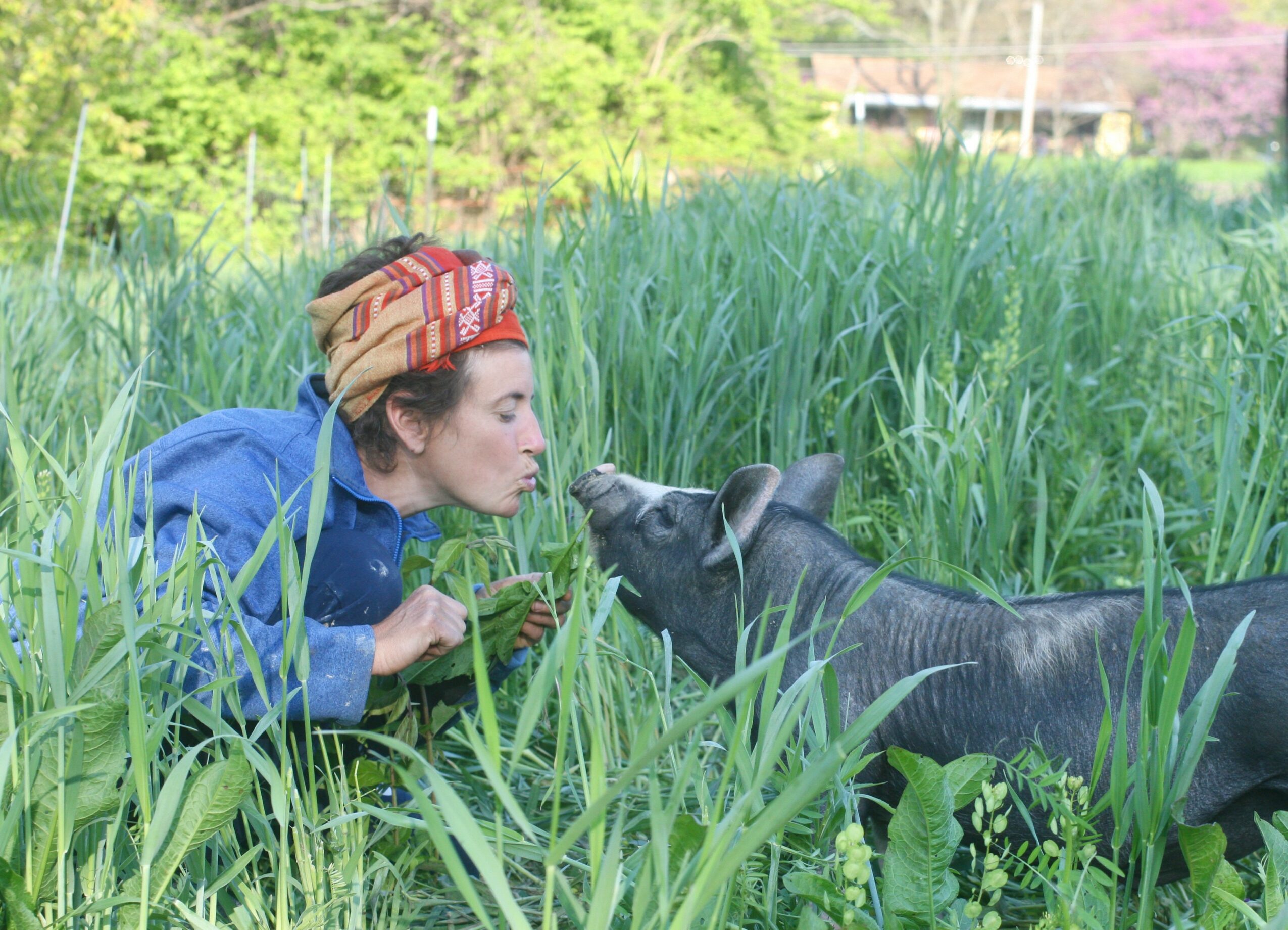

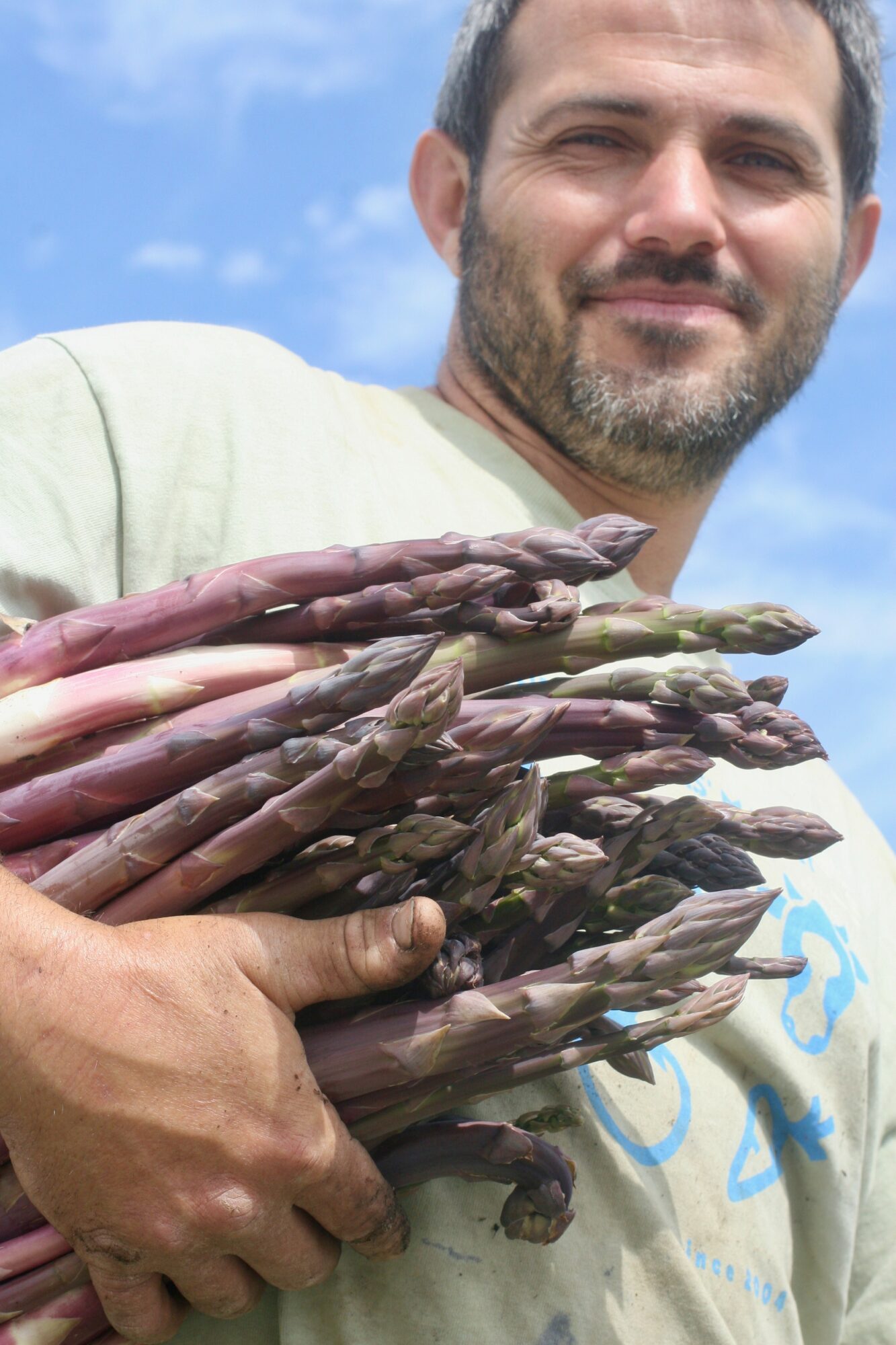
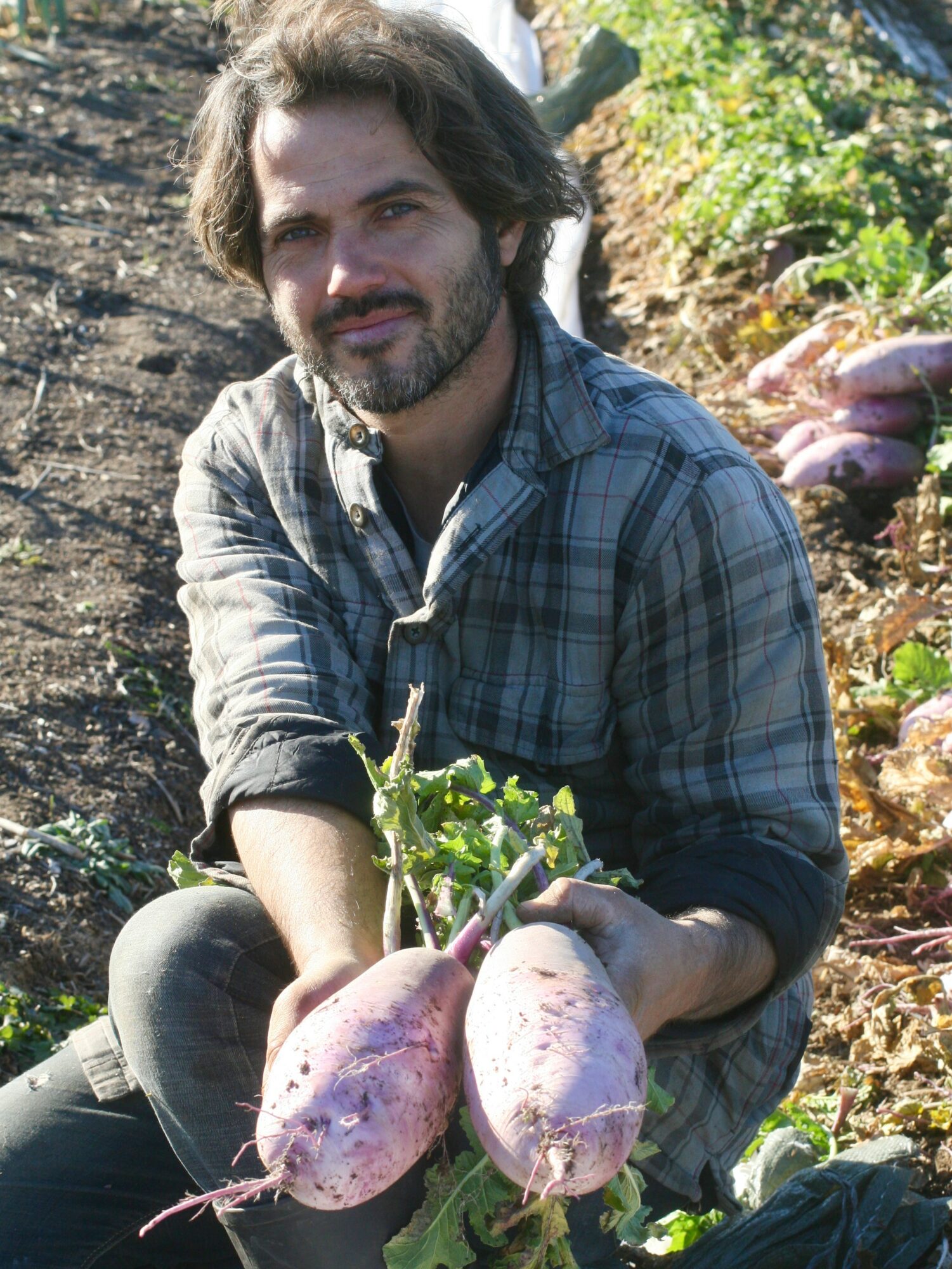
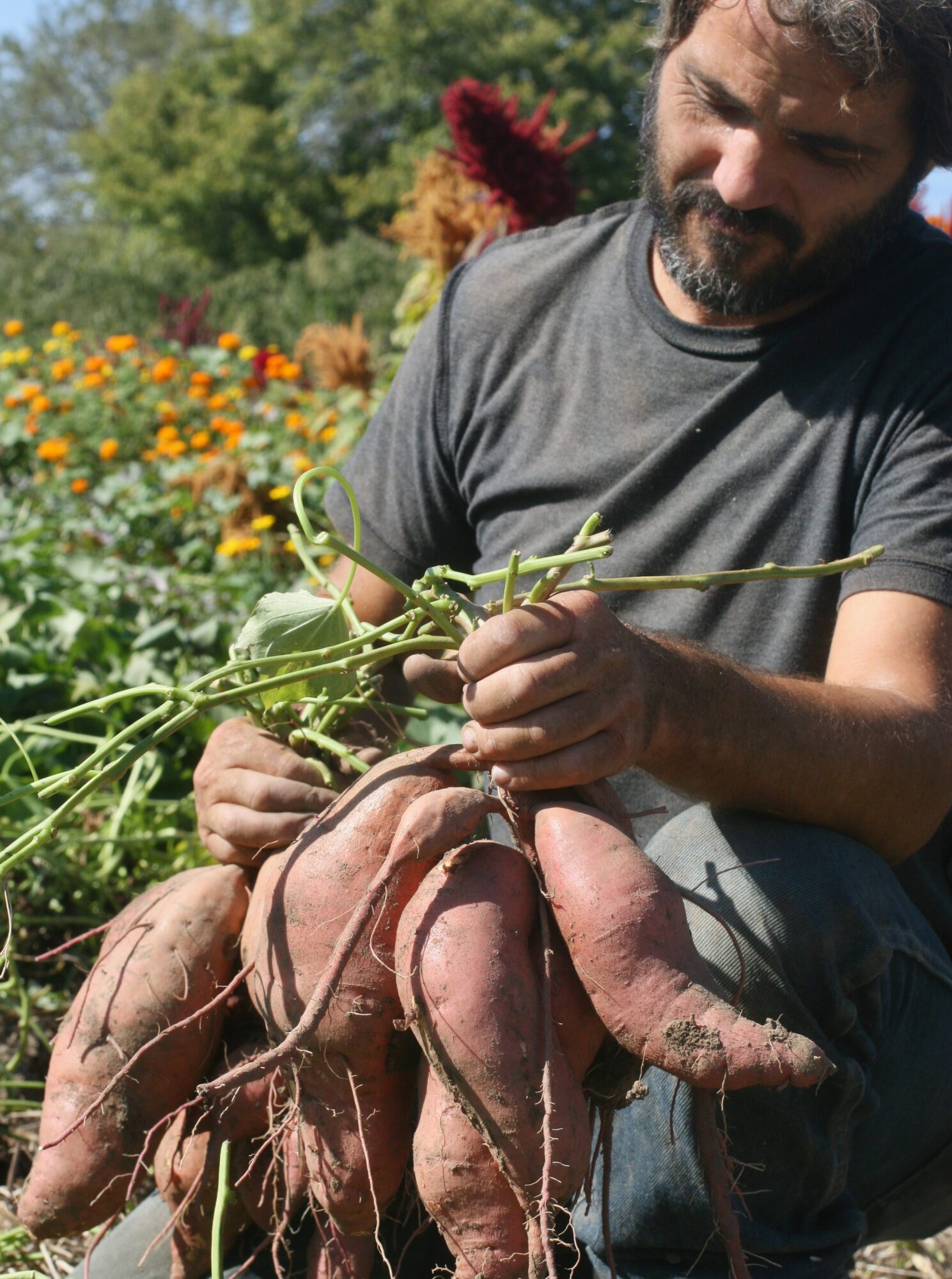
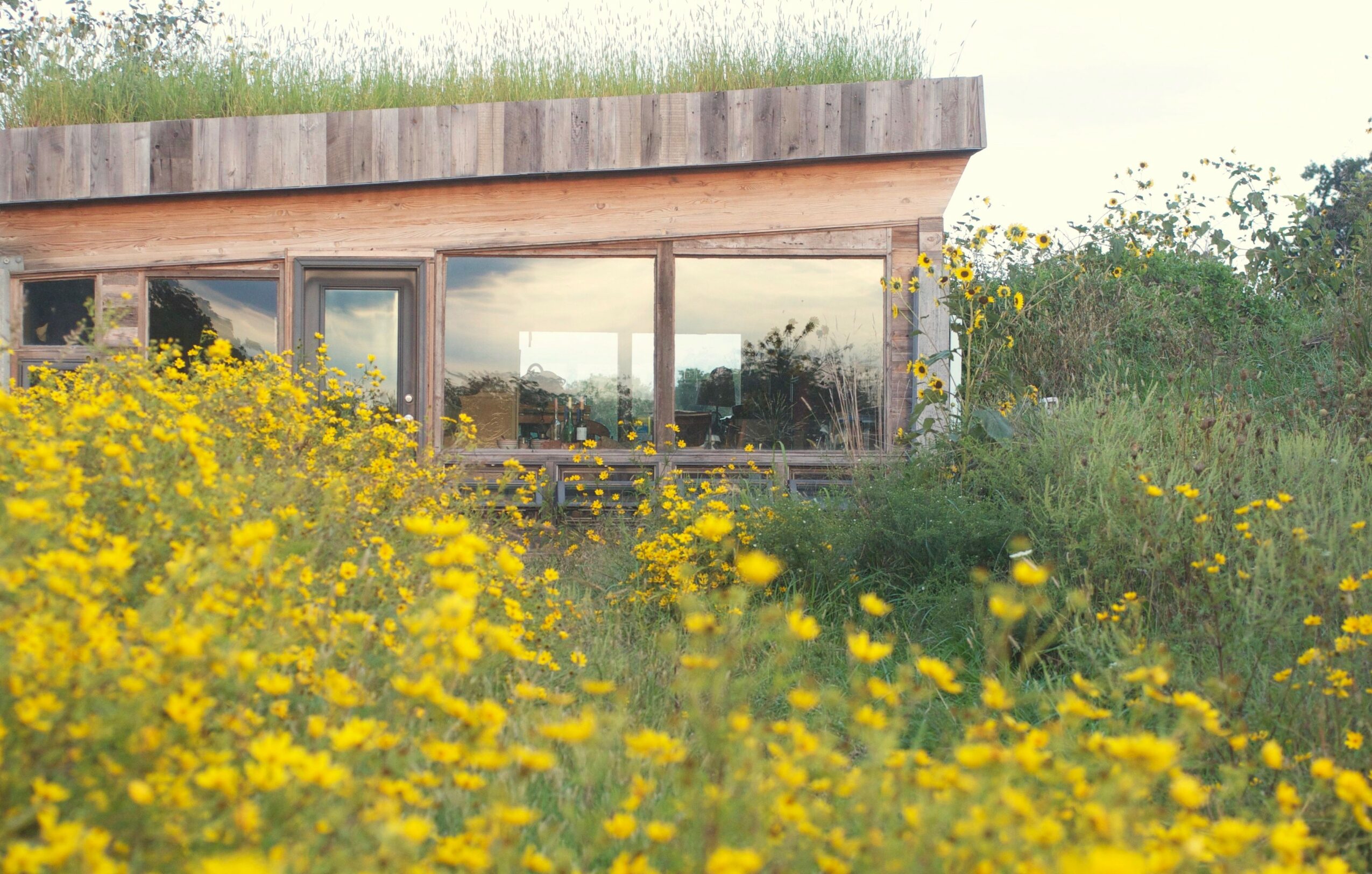
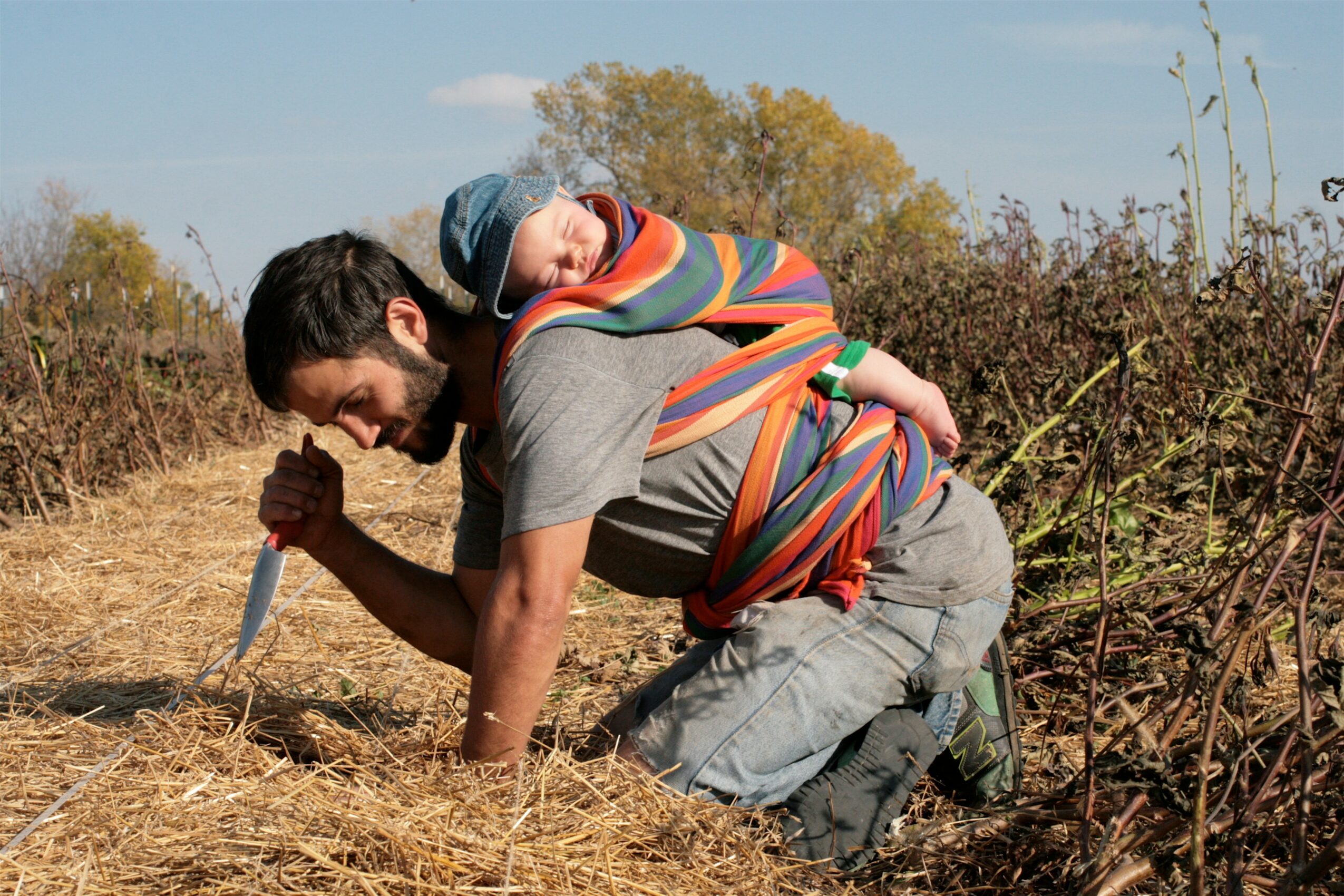
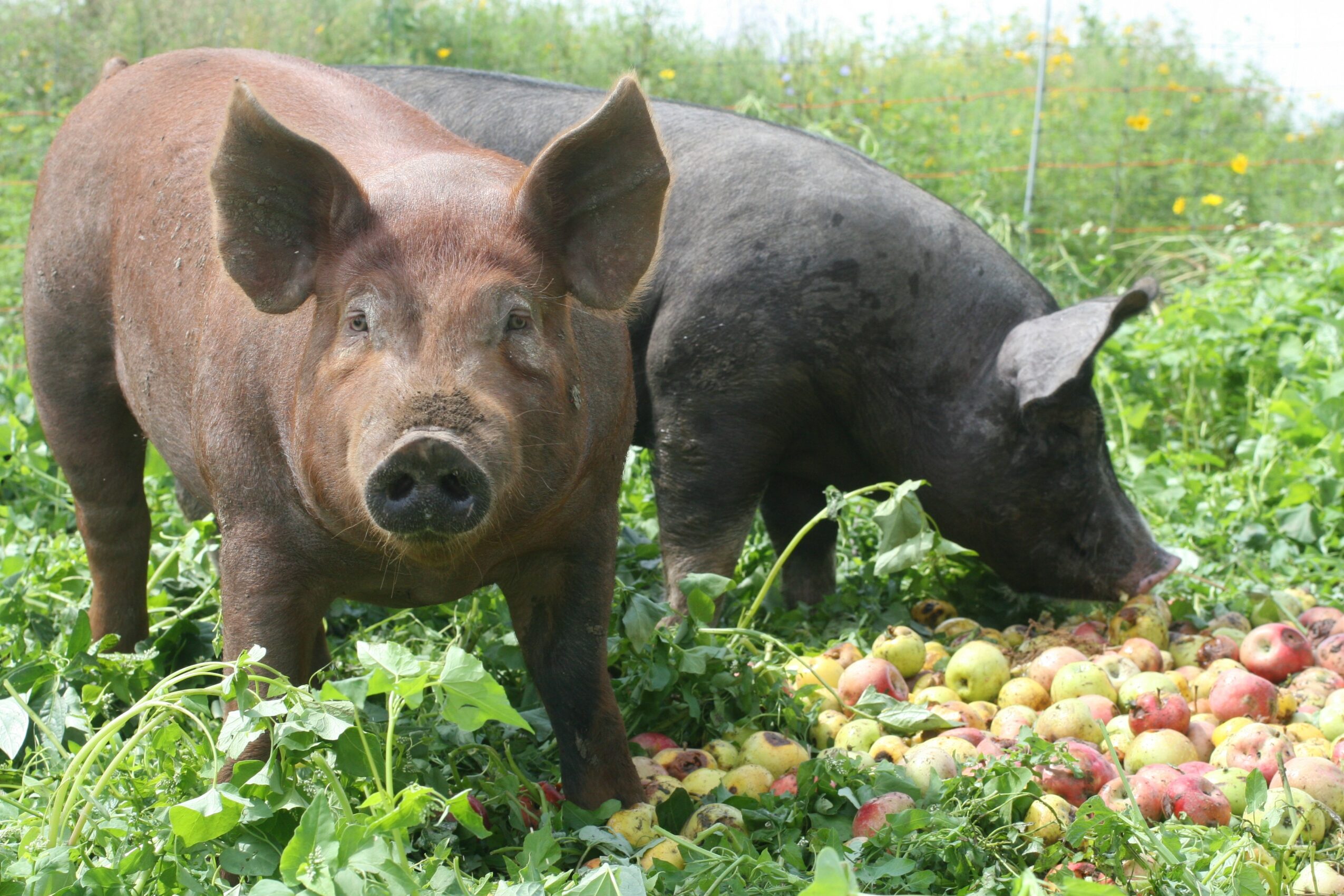 Image Credits
Image Credits
Brooke Salvaggio & Dan Heryer

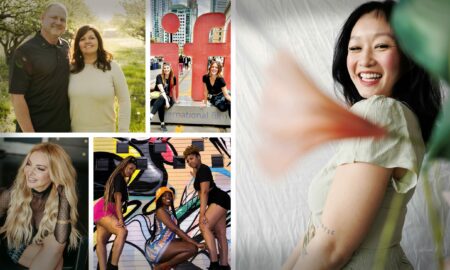











Margaret Lightfoot
March 30, 2022 at 3:40 pm
Thanks for a refreshing and hopeful tale…I imagine there used to be spots like yours in Eastern Europe 🌻
Leona Marie Starcke
September 11, 2024 at 10:55 pm
Brooke, were do you get your hair bands I would like to give it a try for my hair.